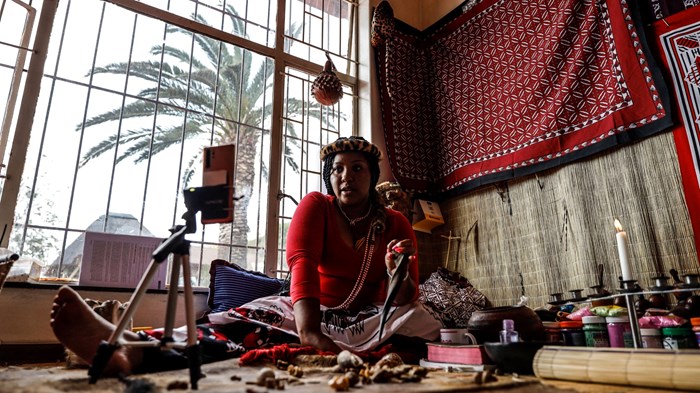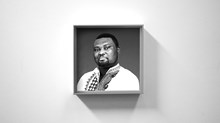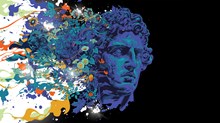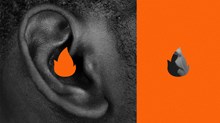
Millions of Black South Africans seek guidance from sangomas, traditional healers or so-called witch doctors who use their spiritual gifts to connect with ancestors, prescribe herbs to heal illnesses, and throw dry bones to predict the future.
It’s a centuries-old tradition that has continued in the majority-Christian country and has adapted for the internet age: A new breed of influencer sangomas are positioning themselves on social media as digital-entrepreneurial-spiritual seers.
Church leaders across several major denominations in South Africa have long decried the practice as involving “evil, devilish, and unclean spirits.” But as the online sagomas draw in a mass audience of millennial Christians—a generation eager to “decolonize” their lives and reconnect to indigenous African roots—church leaders have new concerns around syncretism as well as internet scams.
Condemnation of sangomas and African ancestral worship is the strongest cog uniting European-legacy churches like Anglicans, Baptists, and Catholics as well as African-initiated churches like the Zion Christian Church (ZCC), said Tendai Muchatuta, a cleric with All Nations Church in Johannesburg.
Both kinds of churches say the practice, despite its popularity, is not compatible with Christianity.
The ZCC is the largest African-initiated church in Southern Africa, with about 12 million churchgoers, including some 9 million in South Africa. Bauleni Moloi, a ZCC pastor in Johannesburg, called sangomas “dubious agents of darkness out to sway Christians from the true focus on the gospel of the cross.”
But younger Christians are more likely to disagree. Many millennial and Gen Z South Africans embrace burning incense, joining initiation ceremonies for sagomas (called ukuthwasa), donning ancestral bangles, and reciting ancestral idioms, all with Bible in hand.
As an Africanist awakening sweeps young Black South Africans, many have been calling for the decolonization of their society and institutions, including Christianity.
“They are Christian, they are under 30 years of age, they make the majority of South Africa’s population demographics. They are unlike their parents who grew up under a strict dogma of obeying Lutheran, Catholic, or Presbyterian missionaries,” said one online sangoma, who goes by the handle luthandolove00.
Another sangoma, Gogo Khanyakude, offers online “dream interpretation” and “crossover meditation” for a millennial clientele. “I grew up in a Christian home,” Khanyakude said, “and there’s no conflict in mixing my Christian faith with the sangoma calling work.”
Many online sangomas say they and fellow healers grew up serving in church, singing in the choir, or leading Sunday Bible school, but they couldn’t resist the pull of ancestral calling, which they say they experienced through dreams, possession, or illness that couldn’t be prayed away by their pastors.
Some churches in the area don’t see sangoma rituals as a contradiction to the gospel. Shembe Church in South Africa—the oldest denomination blending ancestor worship and Christianity in the country—welcomes the use of sangomas and attending their initiation ceremonies.
“African spiritualism is a noble way to tame the relentless influence of European Christianism in South Africa,” said bishop Bulawayo Dhoro of Shembe Church. “We don’t see a contradiction but a wonderful blend of two faiths to make them one. In fact, a dozen of our pastors are sangomas too.”
Other Christians see a much greater risk to adding other sources of healing and guidance beyond Christ and his Word. Christian sangomas will damage the integrity of the Christian faith in South Africa if they are tolerated in mainstream churches, said pastor Ezikiel Mamokethe, a retired Presbyterian cleric.
Actor Thabiso Mokhethi quit being a sangoma to pursue ministry and now advises that those who say they can do both are deceived.
“When it comes to God, he has no equal. He cannot share his glory,” he said on the Street Talk podcast earlier this year. “People are lost. … As long as you are submitting to the ancestorial world, you are out of the kingdom of God.
In April, actress Brenda Ngxoli also announced that she “left sangomahood for motherhood and Christianity.”
Some dodgy sangomas in South Africa use voice apps to create fake online sessions where cloned “voices of ancestors” are relayed to gullible clients on WhatsApp or Facebook.
Syndicates of these fake sangomas have fleeced unsuspecting victims of millions of dollars using a combination of hallucinogenic drugs, romance scams, and promises of spiritual encounters with departed ancestors, the South Africa Police Service warned recently.
“They are swaying many souls from the gospel of truth,” said Mamokethe. “Churches must have the courage to excommunicate believers who dabble as sangomas. It’s a scam.”
According to the pastor, “only gullible churches would welcome Christian sangomas.”

Support Our Work
Subscribe to CT for less than $4.25/month


















